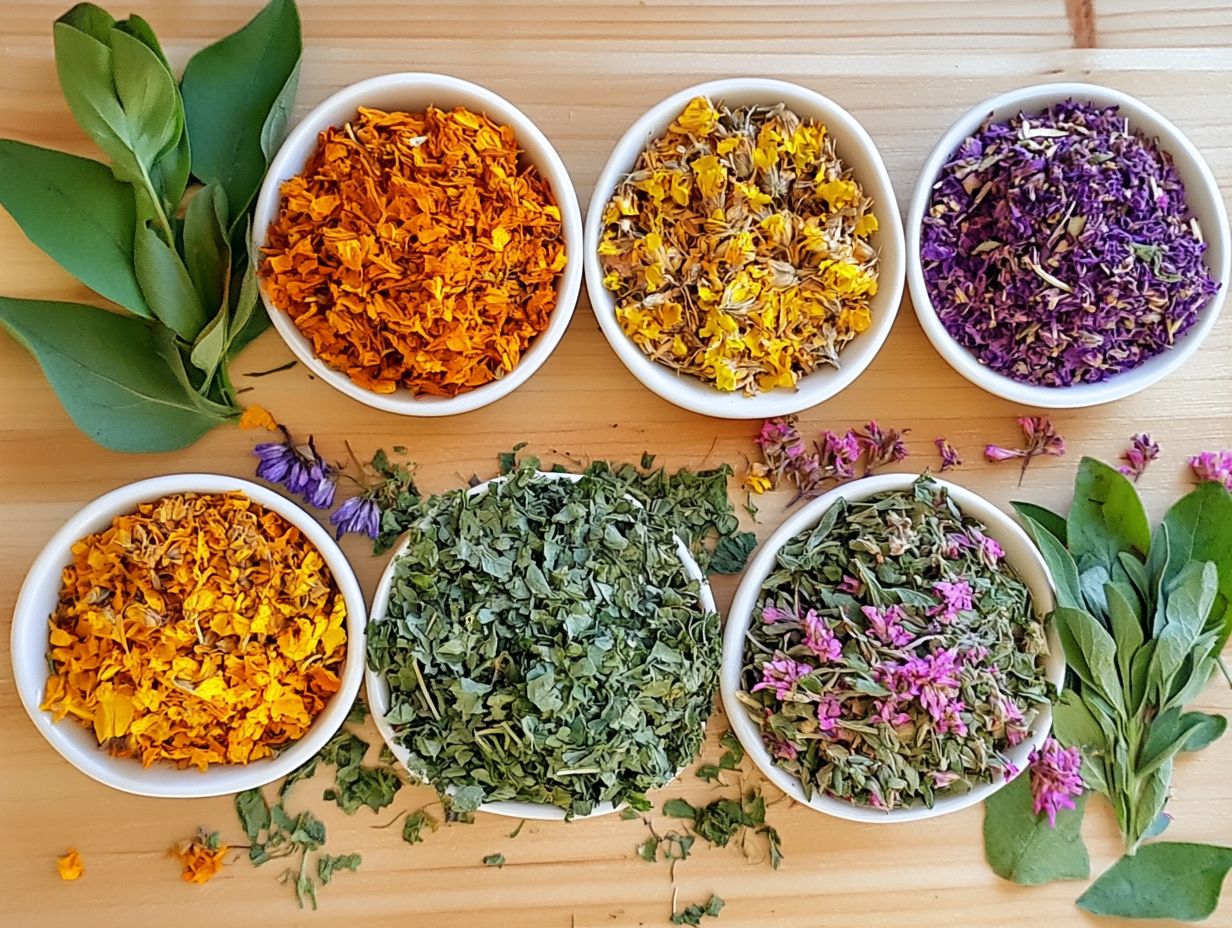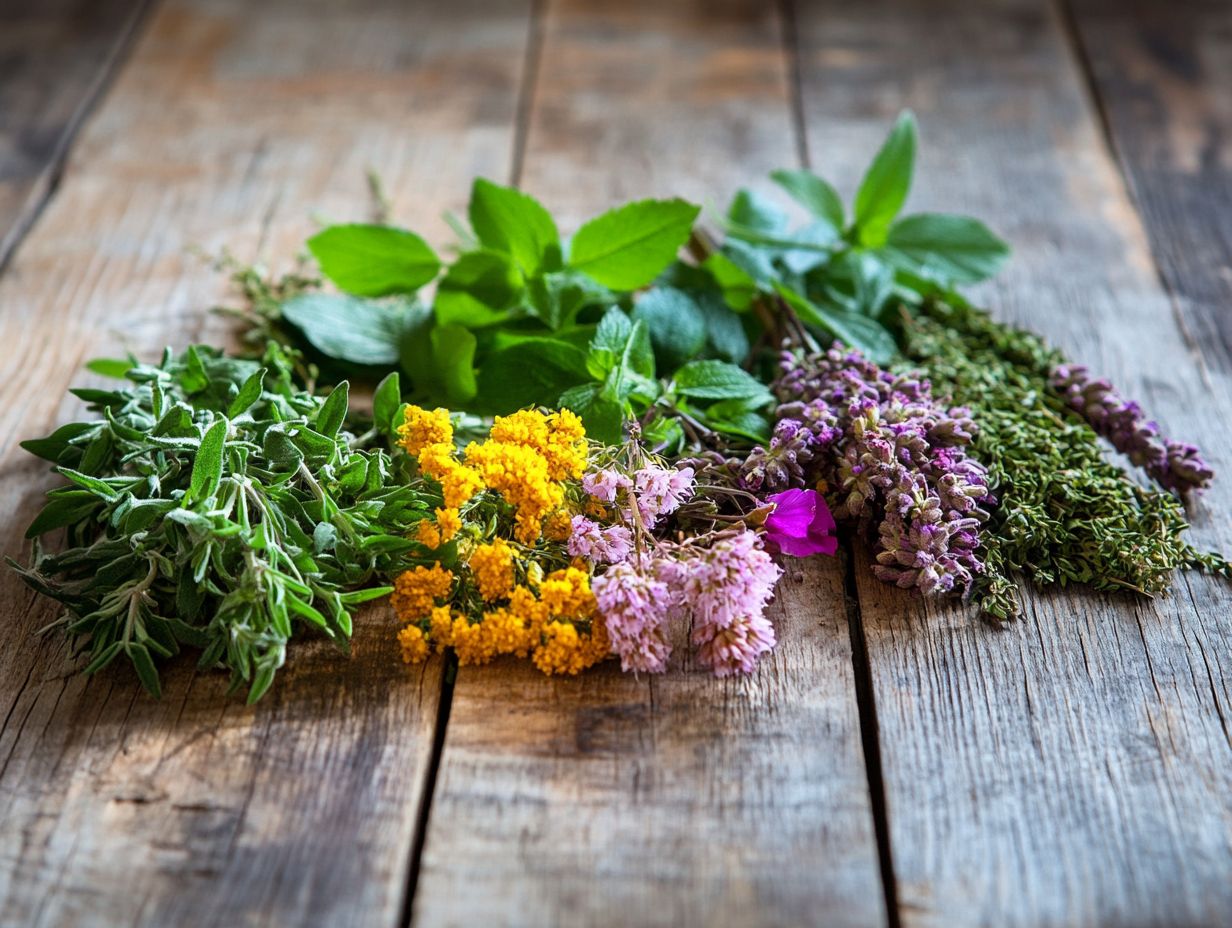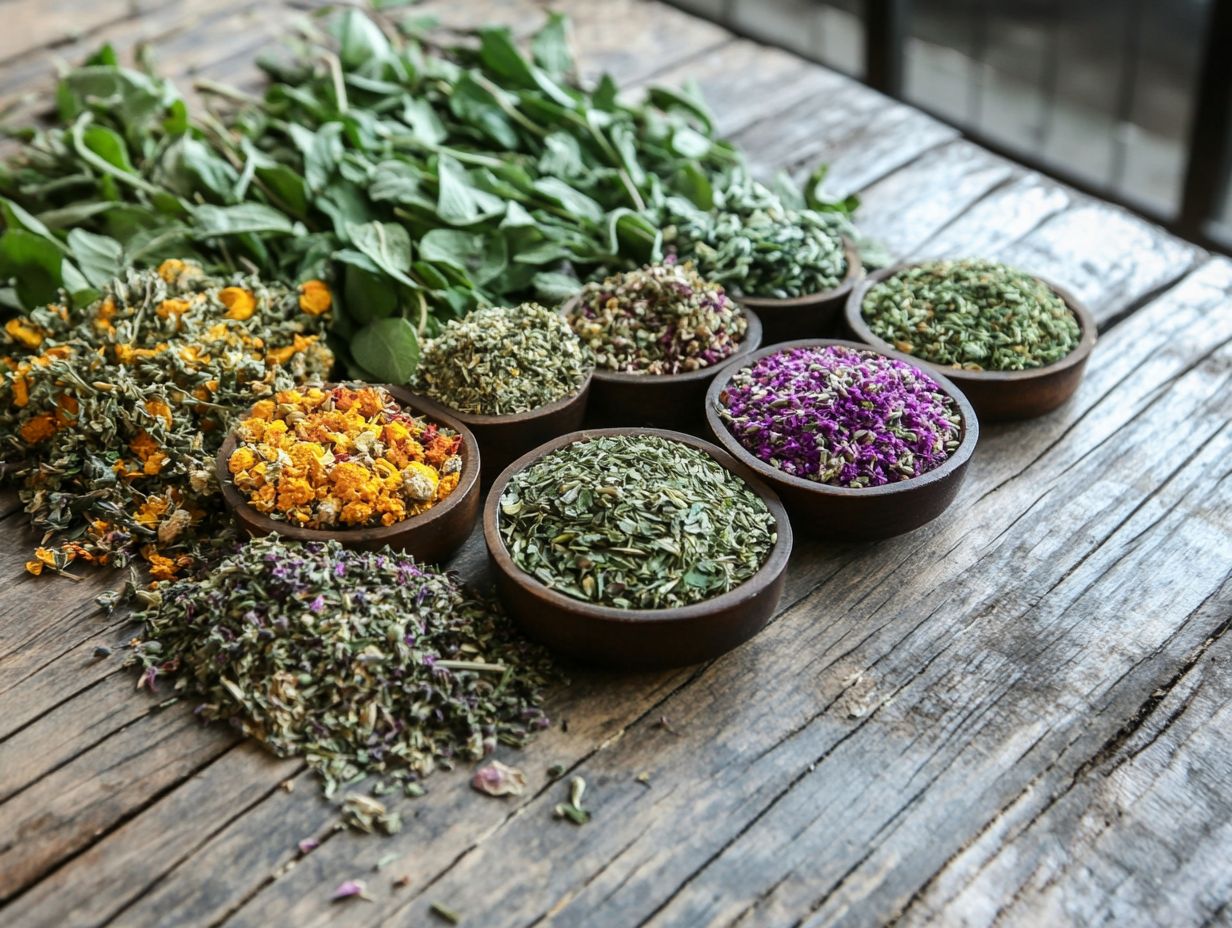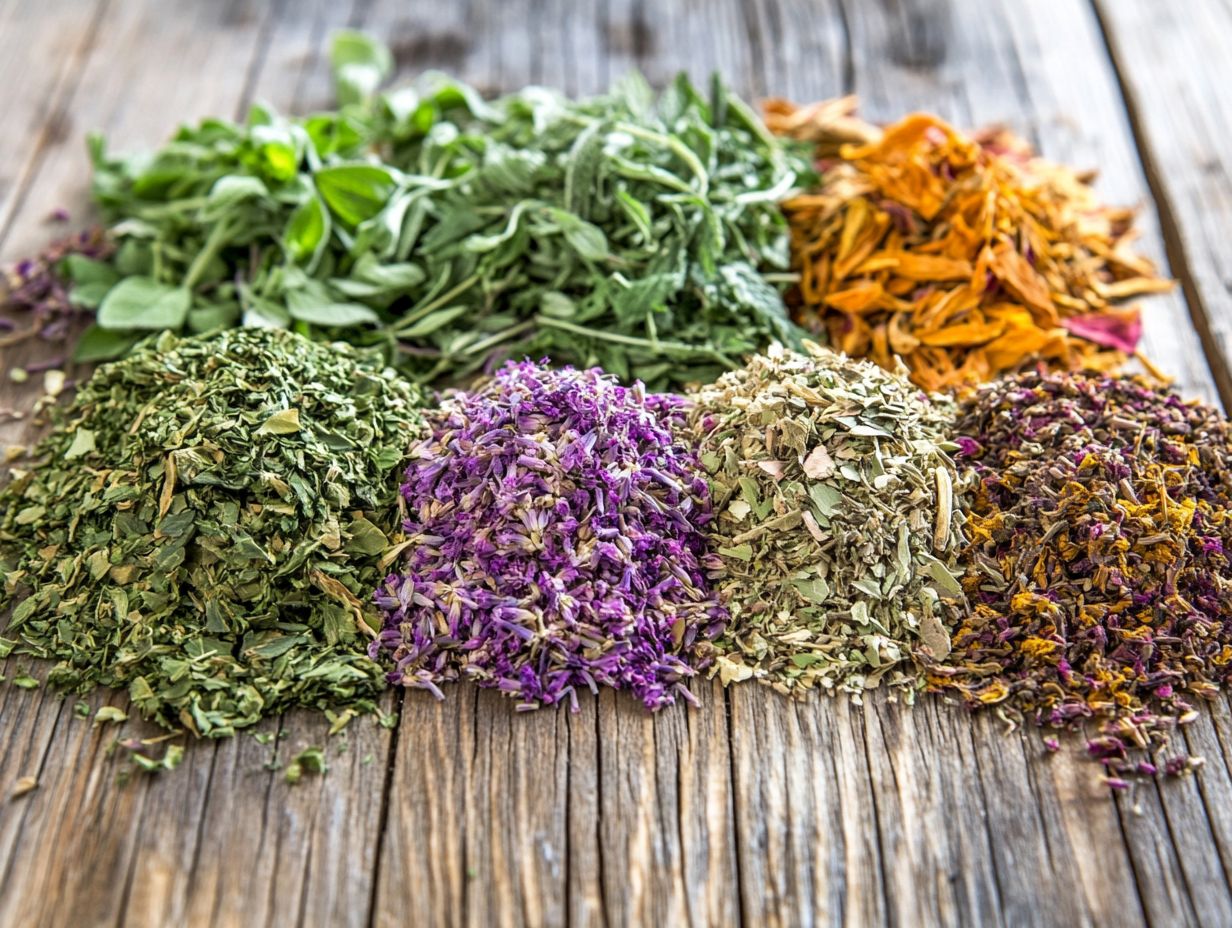7 Naturopathic Herbs for Immune Support
In today s fast-paced world, maintaining a robust immune system is crucial. Fortunately, nature provides a treasure trove of herbs that can help strengthen your defenses against illness.
This article delves into seven powerful naturopathic herbs Echinacea, Elderberry, Astragalus, Garlic, Ginger, Turmeric, and Licorice Root. Each of these herbs is renowned for its immune-boosting properties. You ll discover how to effectively use these herbs, be aware of their potential side effects, and receive tips for seamlessly incorporating them into your daily routine for optimal health.
Whether you’re keen on enhancing your immunity or simply curious about herbal remedies, you will uncover valuable insights and practical advice tailored just for you.
Contents
- Key Takeaways:
- 1. Echinacea
- 2. Elderberry
- 3. Astragalus
- 4. Garlic
- 5. Ginger
- 6. Turmeric
- 7. Licorice Root
- How Do These Herbs Boost the Immune System?
- What Are the Different Forms of These Herbs and How to Use Them?
- What Are the Potential Side Effects of These Herbs?
- Are These Herbs Safe for Everyone to Use?
- Can These Herbs Help with Specific Health Conditions?
- How Can These Herbs Be Incorporated into Daily Life for Immune Support?
- What Are the Other Benefits of These Naturopathic Herbs?
- Frequently Asked Questions
- What are the 7 naturopathic herbs for immune support?
- How do these herbs help boost the immune system?
- Can these herbs be used as a substitute for traditional medication?
- Are there any side effects of using these herbs?
- In what form are these herbs usually taken?
- Are there any precautions to keep in mind when using these herbs?
Key Takeaways:

- Boost your immune system with these 7 naturopathic herbs: Echinacea, Elderberry, Astragalus, Garlic, Ginger, Turmeric, and Licorice Root.
- These herbs can be taken in various forms and have potential side effects, so it’s important to consult with a healthcare professional before use.
- Incorporating these herbs into your daily routine can support your immune system and provide other health benefits.
Now is the perfect time to explore these herbs and boost your immune system!
1. Echinacea
Echinacea stands out as a powerful herb, celebrated for its ability to bolster your immune system and serve as an essential ally during cold and flu season. Its medicinal properties enhance immune function significantly.
This herb can be utilized in various forms like tea, capsules, and extracts. Many users have found that by incorporating Echinacea into their wellness routines, they help prevent common colds and benefit from its impressive antiviral properties, potentially shortening the duration of illness.
The active compounds in Echinacea stimulate your white blood cells, which play a crucial role in fending off infections. By embracing this natural remedy, you can promote enhanced overall health and resilience against seasonal ailments.
2. Elderberry
Elderberry is celebrated for its impressive antioxidant properties, offering a natural boost to your immune system. It effectively tackles cold and flu symptoms while enhancing overall immune function.
This small, powerful berry is packed with vitamins that can supercharge your immune health and has been shown to shorten the duration of respiratory infections. This makes it an invaluable ally during the chillier months.
You can enjoy elderberry in many forms syrup, tea, or blended into smoothies making it easy to incorporate into your daily routine.
By adding elderberry to a balanced diet, complemented by fresh fruits and vegetables, you can elevate your wellness strategies. Regular consumption not only helps ward off illness but also plays a vital role in maintaining your overall vitality.
3. Astragalus
Astragalus is a highly regarded herb in traditional medicine, known for its ability to enhance your immune system and support overall health. It is especially effective for tackling chronic health issues and boosting immune responses.
This herb has a rich history, particularly in Traditional Chinese Medicine, where it s considered a key ally in fortifying the body s defenses against infections and fatigue.
Astragalus is a natural substance that helps your body manage stress while enhancing vitality. This makes it an ideal choice for anyone looking to maintain a robust immune system.
You can enjoy astragalus in various forms, including capsules, tinctures, and powdered root, making it simple to weave into your daily routine.
By integrating these natural remedies with a balanced diet and a healthy lifestyle, you can create a holistic approach to immune health, unlocking the full potential of this extraordinary plant.
4. Garlic
Garlic is more than just a tasty ingredient; it boosts your immune system and helps fight infections.
This humble bulb improves respiratory health by clearing mucus and acting as a natural expectorant.
Try adding garlic to roasted dishes, fresh salads, or soups for a delicious health boost.
When you enjoy garlic regularly, you strengthen your body s defenses and support overall health.
Embracing garlic can lead to a stronger immune system and better respiratory function.
5. Ginger

Ginger is a powerful root that supports your immune system and cuts down on inflammation.
It s packed with antioxidants that help fight infections, especially during cold and flu season.
Incorporate ginger into your routine with warming ginger tea or zesty smoothies.
Ginger not only revitalizes you but also soothes symptoms like cough and congestion.
This versatile root is a fantastic ally in your health journey.
6. Turmeric
Turmeric, often called the golden spice, has incredible health benefits, especially for immune support.
Curcumin, the secret behind turmeric’s magic, packs a punch for your health with its anti-inflammatory and antioxidant properties.
Add turmeric to smoothies, soups, or enjoy golden milk lattes to enjoy its benefits easily.
Pair turmeric with black pepper for better absorption and enhanced immune-boosting effects.
By combining whole foods, exercise, and hydration with turmeric, you can improve your overall health and resilience.
7. Licorice Root
Licorice Root is a remarkable herb famous for its sweet flavor and impressive health benefits.
It’s well-known for supporting the immune system and providing relief for respiratory issues due to its antiviral properties.
This powerful herb has been cherished in traditional herbal medicine for centuries.
Licorice Root is available in teas, tinctures, and capsules, aiding digestion and acting as a natural anti-inflammatory.
It is often recommended for sore throats and indigestion, calming irritated tissues and promoting adrenal health.
This herb plays a significant role in overall well-being, making it a popular choice for natural remedies.
How Do These Herbs Boost the Immune System?
Herbs like Echinacea, Elderberry, and Garlic are essential for boosting your immune system. They enhance immune function and support your overall health.
Rich in antioxidants, these herbs combat oxidative stress, a process that can weaken your immune system. For instance, Echinacea is renowned for its ability to shorten the duration and severity of colds by stimulating white blood cell activity.
Elderberry has strong antiviral properties, effectively inhibiting virus replication. Garlic, celebrated for reducing inflammation, alleviates stress on your immune system.
When combined, these herbs create a synergistic effect, maximizing their benefits and enabling a more robust defense against pathogens. This powerful blend not only bolsters your body’s natural ability to heal but also enhances its protective mechanisms.
What Are the Different Forms of These Herbs and How to Use Them?
These herbs can be embraced in various forms think teas, capsules, tinctures, and extracts each offering a distinctive approach to bolster your immunity and deliver their health benefits effectively.
For instance, herbal teas provide a soothing and hydrating means to enjoy these natural remedies, making them a delightful addition to your morning routine or a refreshing afternoon break.
On the other hand, capsules and tinctures present more concentrated doses, perfect for those seeking specific therapeutic effects without the hassle of preparation.
Using a mix of these forms can enhance their effects. Daily tinctures might boost your immune response, while occasional teas can offer relaxation and digestive support. Recommended dosages may vary, but starting with a low amount and gradually increasing allows for personalized adjustments.
Incorporating these herbal preparations into your daily habits can be remarkably simple just add a cup of tea in the morning or take a couple of capsules with your meals throughout the day.
What Are the Potential Side Effects of These Herbs?

While many of these herbs offer impressive immune support, it’s crucial to be aware of potential side effects that may accompany their use, ensuring a safe approach to herbal medicine.
Take Echinacea, for example it can trigger allergic reactions in some individuals, especially those with a sensitivity to daisies. Similarly, Elderberry might interact with certain medications, particularly immunosuppressants, leading to unexpected complications.
Herbal remedies like Garlic can thin the blood, so if you’re considering using it alongside anticoagulants, you could inadvertently amplify this effect, raising the risk of bleeding.
Therefore, consulting with a healthcare provider is crucial before diving into these herbal options. This conversation can illuminate any contraindications based on your personal health profile and ensure you’re taking the appropriate dosages, allowing for a balanced and safe integration of herbal support into your wellness routine.
Are These Herbs Safe for Everyone to Use?
The safety of herbal remedies can differ from person to person, making it essential for you to evaluate your health conditions and consult with healthcare professionals before adding them to your wellness routine.
Several factors play a crucial role in this assessment, such as your age, any pre-existing health issues, and unique situations like pregnancy. For example, older adults might metabolize herbs differently due to physiological changes, while individuals with chronic conditions may face adverse interactions.
If you’re pregnant, you need to exercise extra caution, as some herbs could potentially pose risks to fetal development. Adopting a personalized approach to herbal medicine is vital; it ensures that your choices are aligned with your health status and medical history.
Engaging in an open dialogue with your healthcare provider can help you make safe, informed decisions.
Can These Herbs Help with Specific Health Conditions?
Many herbs have been traditionally employed to address specific health conditions, particularly those related to the immune system. They provide natural remedies for common ailments like respiratory infections and cold symptoms.
Take echinacea, for example. It’s known for helping your immune system and potentially shortening both the duration and severity of colds.
Then there’s elderberry, known for its antiviral properties that can alleviate flu symptoms while also enhancing your overall immune function.
Garlic also deserves a mention, celebrated for its natural antibiotic effects, which can help reduce your risk of infections by fortifying your body’s defenses.
By incorporating these herbs into your daily routine, you might uncover effective ways to support your health naturally and fend off those pesky common illnesses.
How Can These Herbs Be Incorporated into Daily Life for Immune Support?
Incorporating herbal remedies into your daily life can significantly enhance your immune support, offering various methods to savor the health benefits these natural ingredients provide.
Just picture brewing a calming cup of chamomile tea or indulging in ginger-infused smoothies there are countless ways to seamlessly integrate these powerful herbs into your everyday routine.
You could create herbal-infused oils for cooking or sprinkle turmeric into your favorite dishes. This elevates not just the flavor but also the nutritional value.
Many people find that taking herbal supplements, like elderberry extracts, offers a quick and convenient way to strengthen their defenses.
These natural methods promote a healthier lifestyle. They help you take charge of your well-being through nature’s abundance.
What Are the Other Benefits of These Naturopathic Herbs?
Beyond just supporting your immune system, these naturopathic herbs bring a wealth of health benefits to the table. Their anti-inflammatory and antioxidant properties play a significant role in enhancing your overall wellness and aiding in disease prevention.
Not only do these herbs boost immunity, but they also elevate digestive health, sharpen mental clarity, and foster emotional balance.
Take turmeric, for instance. Its curcumin content not only helps diminish inflammation but also supports joint health and alleviates pain.
Then there s ashwagandha, renowned for its properties that help your body manage stress and encourage relaxation.
By weaving these powerful herbs into your daily routine, you can adopt a proactive approach to your health. This strategy enables you to address various facets of well-being, cultivating a sense of holistic balance that goes beyond mere symptom management.
Frequently Asked Questions

What are the 7 naturopathic herbs for immune support?
The 7 naturopathic herbs for immune support are Echinacea, Elderberry, Astragalus, Andrographis, Garlic, Oregano, and Licorice root.
How do these herbs help boost the immune system?
These herbs contain specific compounds and antioxidants that have been shown to support and strengthen the body’s natural defense mechanisms.
Can these herbs be used as a substitute for traditional medication?
No, these herbs are meant to complement a healthy lifestyle and should not be used as a substitute for prescribed medication. It’s important to consult with a healthcare professional before starting any new supplements or herbs.
Are there any side effects of using these herbs?
Some people may experience mild side effects such as digestive upset or allergic reactions, but they are generally considered safe for most individuals. It’s important to follow recommended dosages and stop use if any adverse reactions occur.
In what form are these herbs usually taken?
These herbs can be taken in various forms, such as capsules, teas, tinctures, or extracts. It’s important to follow the recommended dosage and instructions on the product label.
Are there any precautions to keep in mind when using these herbs?
Yes, it’s important to be aware of any potential interactions with other medications or supplements. It’s also recommended to start with small doses and gradually increase as needed. Pregnant or nursing women should consult with their healthcare provider before using these herbs.
Ready to boost your health? Talk to a healthcare provider about these powerful herbs today!






